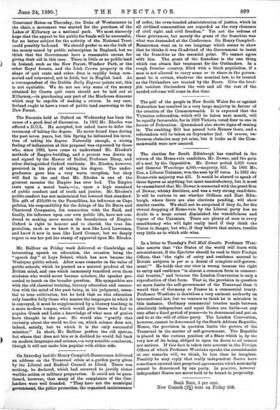In a letter to Tuesday's Pall Mall Gazette Professor West-
lake asserts that "the States of the world will learn with astonishment, if the Spectator should be read in their Foreign Offices, that the right of entry and residence secured to British subjects is per se a denial of complete self-govern- ment.'" He holds that our view is wrong because the right to entry and residence "is almost a common form in commer- cial treaties," and because the London Convention is only a reproduction of that form. That is, the provision in question no more limits the self-government of the Transvaal than it would that of Germany or France in a commercial treaty. Professor Westlake is doubtless a very eminent authority on international law, but we venture to think he is mistaken in this instance. Ordinary commercial treaties made between absolutely independent and equal States are liable—at any rate after a fixed period of years—to be denounced and put an end to at the will of either party. The London Convention, however, cannot be denounced by the South African Republic. Hence, the provision in question limits the powers of the Transvaal in the matter of self-government. The Republic is placed in the curious position of a State which is, by the very law of its being, obliged to open its doors to all comers not natives. If this fact is taken into account in the Foreign Offices of which Professor Westlake speaks the astonishment at our remarks will, we think, be less than he imagines. Possibly he may reply that really independent States have sometimes entered into perpetual agreements which nominally cannot be denounced by one party. In practice, however independent States are never held to be bound in perpetuity.


















































 Previous page
Previous page